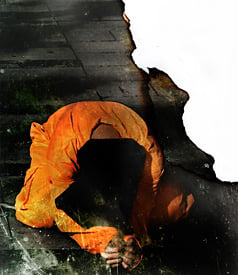(Photo: electron; Edited:
Jared Rodriguez / t r u t h o u t ) Nearly three years after he was appointed to investigate the destruction of at least 92 interrogation videotapes, a dozen of which showed two high-value detainees being subjected to various torture techniques by CIA interrogators, Special Prosecutor John Durham has determined that he does not have enough evidence to secure an indictment against anyone responsible for the purge.
Department of Justice (DOJ) spokesman Matthew Miller said in a statement Tuesday that Durham, a US Attorney from Connecticut, has "concluded that he will not pursue criminal charges for the destruction of interrogation videotapes."
The statute of limitations for bringing criminal charges related to the destruction of the tapes ran out Monday. Truthout contacted Durham's spokesman, Tom Carson, late Monday evening raising questions about whether Durham's investigation was ongoing in light of the statute of limitations expiring or whether he had concluded his probe. Carson, in an email sent to Truthout hours before Miller issued a statement, said Durham's investigation is still an "open matter."
In response to additional queries requesting clarification of his statement, Carson said, the investigation is "still an open matter, but DOJ will not pursue criminal charges for the destruction of the tapes."
Two people close to the probe told Truthout they were told that means there is a possibility Durham could pursue other charges, such as false statements, the targets of the probe made during the course of the investigation, but they doubted Durham would do that.
Jose Rodriguez, the head of the CIA's clandestine division, who had been one of the primary targets of Durham's criminal investigation, ordered the destruction of the videotapes in November 2005, shortly after The Washington Post published a front-page article exposing the CIA's use of so-called "black site" prisons overseas to interrogate alleged "war on terror" suspects using torture techniques that were not legal on US soil. Rodriguez said he received clearance from agency attorneys.
One witness in the case who worked with Rodriguez said, "I can't believe Rodriguez got away with it" upon learning that Durham would not prosecute his former colleague.
In a statement, Robert Bennett, Rodriguez's Washington, DC-based attorney, said "we are pleased that the DOJ has decided not go forward against Mr. Rodriguez."
"This is the right decision because of the facts and the law," Bennett said. "Jose Rodriguez is an American hero, a true patriot who only wanted to protect his people and his country."
The DOJ's announcement was made on the same day George W. Bush published his memoir, "Decision Points," where he defended the efficacy of torture and falsely claimed that it resulted in actionable intelligence that helped thwart pending terrorist plots. Bush also admitted that he personally authorized the CIA to waterboard self-professed 9/11 mastermind Khalid Shiekh Mohammed and signed off on ten brutal torture methods CIA interrogators used against 33 detainees.
The announcement was also made less than a week after State Department Legal Advisor Harold Koh told a delegation gathered in Geneva, Switzerland for the United Nations Human Rights Council, which scrutinized the United States' human rights record, that inquiries into the Bush administration's use of torture were still under investigation by Durham.
"Those investigations are ongoing," Koh said. "The question is not whether they would consider it those discussions are going on right now."
Anthony Romero, executive director of the ACLU, said Durham's decision "is stunning."
"There is ample evidence of a cover up regarding the destruction of the tapes," Romero said. "The Bush administration was instructed by a court of law not to destroy evidence of torture, but that's exactly what it did. The destruction of these tapes showed complete disdain for the rule of law."
It is widely believed that the videotapes were destroyed to cover up illegal acts. It is also believed that the tapes were destroyed because Democratic members of Congress who were briefed about the tapes began asking questions about whether the interrogations were illegal, according to Jane Mayer, author of the book, "The Dark Side" and a reporter for The New Yorker magazine.
"Further rattling the CIA was a request in May 2005 from Sen. Jay Rockefeller, ranking Democrat on the Senate Intelligence Committee, to see over a hundred documents referred to in the earlier Inspector General's report on detention inside the black prison sites," Mayer wrote in her book. "Among the items Rockefeller specifically sought was a legal analysis of the CIA's interrogation videotapes.
(Note: You can view every article as one long page if you sign up as an Advocate Member, or higher).





